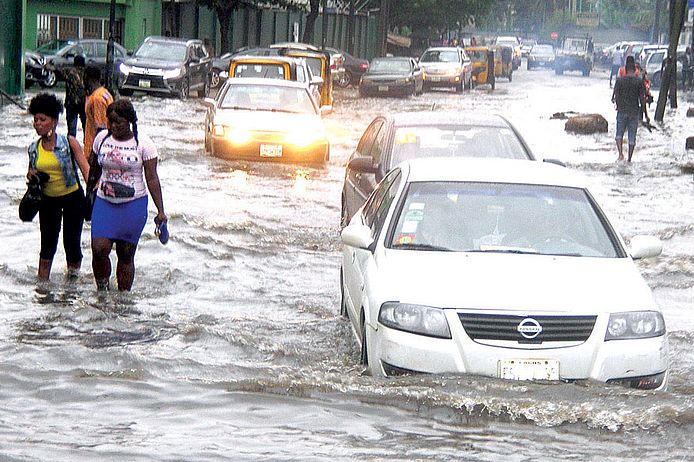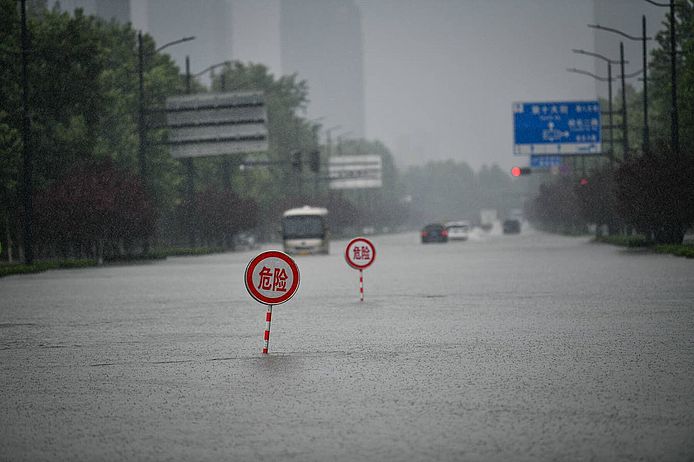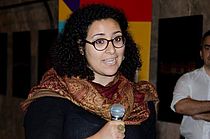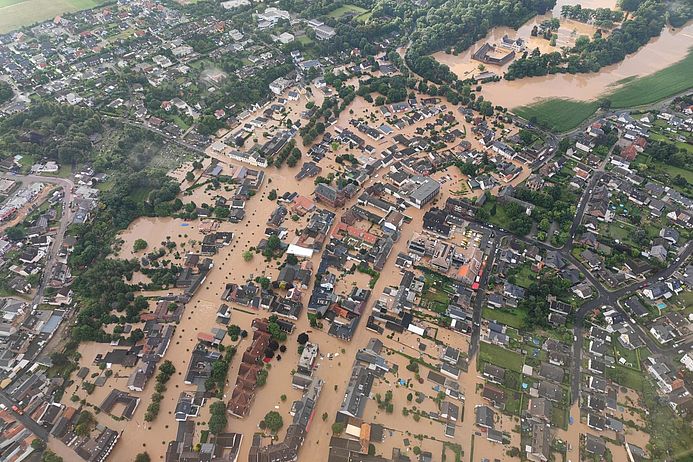News on Al-Jazeera on 18 July 2021. As the voice of the Arabic-speaking newscaster is filling the room, I see images of the floods in Germany. The news report afterwards: Floods in Oman. Then a report from Idlib, Syria, where farmers* have collectively installed solar panels on their fields.
One day later, colleagues in the medico office tell that partner organisations from Somalia, Indonesia and the Philippines, from Sierra Leone, Mexico and Lebanon have contacted them asking about the well-being of the medico team. "We have seen the pictures, is everything ok?" Relatives from Egypt have also called: "We could hardly believe the pictures on the news are from Germany" and "Good thing the sky passed you by this time," they say. On Twitter: Churches in Botswana, the Democratic Republic of Congo, Cameroon, Rwanda, South Africa and Tanzania donate 20,000 euros for flood emergency relief in Germany.
I switch the channel. Formula 1 race at Silverstone. Do they actually have electric engines? "Hybrid," says my brother. The Afro-Brit Lewis Hamilton wins. A banner hangs among the British spectators, the camera zooms in: "It's coming home!" They mean the trophy.

I scroll through Facebook. The "Saudi Gazette" also reports. In the picture accompanying the report, one can see two houses in the floods, or rather: One sees the roof tiles, next to them a green spot, probably the remains of a tree crown, and a yellow spot. I zoom into the picture. The yellow spot is the upper half of an advertising flag of a supermarket chain. It is waving, only half over water. Somewhere in the flat I share there was a brochure of the chain advertising grill-meat at a ridiculous price. Did the Saudi Gazette unintentionally provide a visual symbol of the current situation? The image of an imploding imperial mode of living half under water? Yet things were looking so good for green capitalism! Green New Deal in the USA, the EU and China.
But it seems we are already beyond the tipping point. It appears that the planet is ageing and dying faster than predicted, faster than the worst predictions. Doesn't look like it at all, given the EU's Green New Deal, which suggests the possibility of not only surviving but also living together. The idea is as follows: Climate neutrality + economic growth + social justice. Also hybrid. What is meant is a socially balanced transformation of the economies that can afford it. In the states that are "systemically important". Not included are the human costs in "other" places on which this transformation is built and without which it would not be possible. They are understood as given in the formula of transformation that paints the contradictions of the global capitalist system green.
Green New Deal or Green Neo-Colonialism?
An example to illustrate: Philippine climate journalist and former programme manager of the Rosa Luxemburg Foundation's Climate Justice Office in Manila, Alanah Torrabla, describes the upcoming consequences of the Chinese, US and European Green New Deal on the Philippines. The related stimulus packages point to higher demand for copper. All technologies that are considered more "climate-friendly" require copper. Among other things, because it lowers the amount of energy needed to generate electricity. You find copper in all "green" engines and in "green" high-tech electronics. For the first time, the price of copper rose to 7000 US dollars per tonne in 2018.
"When the global demand increases, it is met with policies that allow more foreign investments. The Philippines' mining industry does not serve our needs or our economy. [...] If there are more mining concessions, there will also be more human rights violations. That is our fear, because the mining law of the Philippines does not currently contain strong measures to protect against human rights violations," says Lia Alonzo, Executive Director of the Philippine Center for Environmental Concerns (CEC), an organisation that works with mining communities and environmentalists, in an interview with Alana Torrabla. But it's not just copper from the Philippines. The situation is similar in the Congo for cobalt and in Chile, Argentina and Bolivia for lithium. The raw materials are shipped, processed and are then to be imported by the "developing countries" in order to jointly create the energy turnaround with green engines. The Green New Deals are built on economic cushioning of change internally, and exploitation and isolation externally.

The European Council for Foreign Relations has put it in a nutshell: the EU's Green New Deal is above all a foreign policy agenda that will shape European geopolitics. The aim is to "achieve climate neutrality by 2050 and turn the transition into an economic and industrial opportunity for Europe".
If you look at the architecture of the stimulus packages, it reminds you of the colonial-era houses in Cairo or Kolkata - in Egypt their style was euphemistically called "Belle Époque". These houses were built so that the colonial rulers and the people who were made servants could live together in one house. However, they lived in parallel worlds. Rooms, staircases and corridors were skilfully separated from each other so that the colonial masters could only see the results of the work, but the process of the work and the workers themselves were made invisible. Then came the water damage.
Central Europe is part of the world
The water damage was not expected now and not like this. Warnings were apparently handled with gross negligence. This ignorance can only emerge from imperial arrogance. The myth of European modernity dissolves in the floodwater. "The German language hardly knows any words for the devastation that has been wrought here," Merkel said during a visit to the flooded area in Schuld, Rhineland-Pfalz. For a moment at least, Europe has suddenly and unwillingly become part of the world. The logic of climate catastrophe does not distinguish between supposedly systemically important and unimportant countries. And besides, the state of the world is long ahead of the deals.
This moment, as volatile and fragile as it is, holds something in itself. It was a glimpse into a possible future. The future of a world that urgently needs (re)construction. For this, Central Europe must "re-member". A mixture of remembering, to critically engage with one's own history in the world, and re-membering, to become a member again.
Re-member-ing Central Europe
To remember means to venture into the labyrinth of one's own history, to tell it again differently, learning and humble. "Between 1765 and 1938, Britain extracted the equivalent of approximately 45 trillion dollars from India. 45 trillion dollars, which in today's British pounds would be 17 times the GDP of today's Britain," as the Indian economist Utsa Patnaik has calculated. This sum did not only flow to Britain itself, but was distributed across Europe, North America and other settler colonies with the onset of industrialisation. Thus, one can see in it one of the roots of today's economic dominance of "the West", as international financial architect Bhumika Muchhala does. A sense of accountability should emerge from such historical facts. Not in a poorly concealed, continued imperial form of saving the world originating from Europe, but as a member of the world.
Becoming a member of the world again would mean integrating into the world in a way that can allow a good life for everyone and everything. It would mean not turning the disaster into an "economic and industrial opportunity for Europe", as the European Council for Foreign Relations suggests. Becoming a member of the world would mean carrying on the stories of the people who supported each other, who distributed food, who pumped out their cellars together, who helped clear away rubble. Whether in Ahrweiler, in Lagos or in Zhengzhou.
This interconnectedness with and in the world already exists today, embodied in indigenous resistance movements against oil pipelines or mining projects, in the worldwide demonstrating students of Fridays for Future, transnational eco-feminists, in the squatters of the Dannenröder Forest or the Guardians of Lake Poso, to name but a few. They embody the possibility of a not too dystopian future.
Radwa Khaled-Ibrahim

Radwa Khaled-Ibrahim is responsible for Critical Emergency Aid in medico's public relations department. The feminist political scientist is also active in donor communication.

